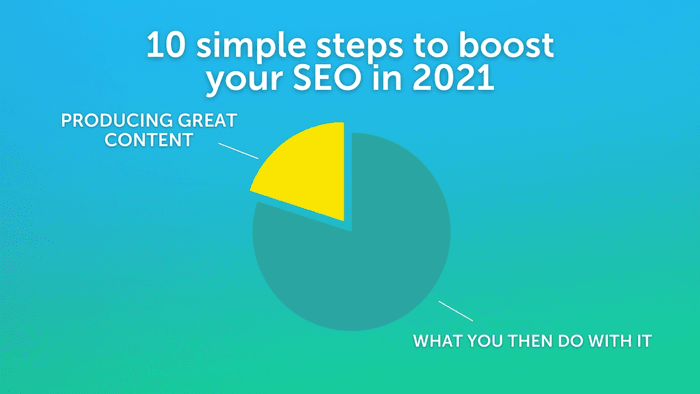Content Marketing & SEO
SEO for Small Businesses: it's how you fill your pipeline
Your business is taking off. Referrals, emails, and even social media have brought customers your way. You’re doing well, but you have a pipeline to fill.
You might also be sitting on a few emails from ‘experts’ offering one three-lettered fix to all your worries: SEO (Search Engine Optimisation.)
If you’re new to SEO, you are missing opportunity to bring new visitors your way. However, while most experts can offer you increased eyes on your brand, most of them won’t generate leads for you.
Why?
If what you say doesn’t matter to your target audience, then it’s not worth putting in front of them.
Getting started with SEO doesn’t mean throwing that simple marketing golden rule out the door. Doing it well means reaching people at stages of the sales funnel you might not have been able to engage with yet with meaningful solutions to their problems.
Here’s what you need to know.
What is SEO – and is SEO worth it for small businesses?
If you’re searching for anything with Google – from ‘what is an LED dimmer’ to ‘tech support near me’ –you’ll see a list of results, and you’ll rarely need to click on anything other than the first three.
Since over 2/3 of customer journeys online start with Google, and Google handles over 90% of all searches, it’s no wonder that businesses battle to make their websites appear at the top of Google’s search rankings.
The ways they do that are collectively known as SEO.
For small businesses that don’t have a sizeable budget for marketing, SEO improvements – such as speeding up your site or answering customer questions in your blogs - can cost nothing more than your time.
So, to answer ‘is SEO worth it for my small business’: it absolutely is.
The problem is, when experts offer their help, they rarely think about what you are saying, but rather, how Google sees it.
Why do most people get SEO wrong?
How many times have you clicked on a site from Google, only to click off it a few seconds later because you didn’t find what you needed?
When it comes to clicks, Google won’t discriminate: it will still count your visit as a ‘click-through’ to that site, and many experts rely on that specific KPI to show how valuable their SEO expertise has been to you.
While having more eyes on your site is certainly positive, the surprise comes when you don’t see any leads as a result.
In any other marketing channel, it would be unacceptable, but low knowledge of SEO, particularly for small businesses, gives them free rein to completely ignore your target audience and obsess over stats.
As we mentioned earlier, having ‘good SEO’ only matters if what you are optimising is worth your audience reading in the first place.
Otherwise, it’s a glorified box-ticking exercise.
How to do SEO right for your small business
Whether you want more people to act on your product page, or you use content to reach out to prospects simply looking for answers to their problems, the best SEO help for your small business we can provide is this:
Write with empathy.
It may sound trite, but it’s a crucial step that SEO experts miss – but the best marketers don’t.
If you can show that you understand your customer’s questions and you can provide answers to their biggest pain points – be it in your thought leadership pieces, or even your product descriptions - the more likely you can turn a click into a conversion.
Remember that, and getting started with SEO improvements themselves will be much simpler.
DIY SEO for Small Business – 3 things you can do to improve SEO right now
SEO is a minefield of Jargon, and while there are useful KPIs to track, getting started with SEO should have you concerned first and foremost with three critical, audience-focussed things on your site:
1. Answer your customer’s questions.
If you type a common question that your customer asks you into Google, you can see how your competitors are answering it – and see the gaps in their answers. That’s where you can position your unique solution with dedicated blog content – or by updating old blogs with fresh advice.
2. Make sure they can find you.
If customers are looking for a product or service, they’ll often add ‘near me’ or the name of their town. It’s vital to set up Google My Business for your company to have a chance at prominent placement in Google – and to reach people who may be looking for a solution near them.
3. Make navigating your site seamless
We mentioned how quickly you can leave a site if you don’t find what you need – and we’re certain you do the same if it takes too long to load.
Google gives weight to how easily and quickly readers can navigate your site: so, make sure that you make the experience seamless. Reducing large image file sizes and making pages simple to navigate are good places to start.
At all points, imagine yourself as your customer; what would they search for; what answers would help them the most; and can you provide them?
Most SEO experts and agencies rarely think like marketers, and fewer still understand how to empathise with their client’s audiences.
We aren’t ‘most experts’.
We know that if you don’t start with your audience’s needs, then no amount of SEO improvements will generate leads. That’s where reaching out to us can help you pinpoint where your marketing is holding back your SEO.
You can reach our CEO at jenny.knighting@nutcrackeragency.com, or call 0203 941 0305.
Share this:





